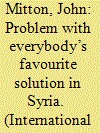|
|
|
Sort Order |
|
|
|
Items / Page
|
|
|
|
|
|
|
| Srl | Item |
| 1 |
ID:
135209


|
|
|
|
|
| Summary/Abstract |
In discussions of NATO’s failure in Afghanistan, there is an increasing recognition of the damaging influence of competition between India and Pakistan. Yet, while reference to “rivalry” abounds, few authors connect Indian and Pakistani behaviour to the established literature on international rivalry. This paper corrects this explanatory gap by applying findings from the subfield of rivalry research. States engaged in rivalry behave differently; each issue of contention is fused into the broader rivalry relationship. For India, influence in Afghanistan is a component of its regional strategy, designed to maintain dominance over Pakistan in South Asia. For Pakistan, influence in Afghanistan is sought primarily for the opportunity to confront, damage, and frustrate Indian aims. The result is continued violence and instability. For policymakers, an appropriate appreciation of the strategic and political realities in a given region is a prerequisite for future international interventions in order to avoid such complications.
|
|
|
|
|
|
|
|
|
|
|
|
|
|
|
|
| 2 |
ID:
146496


|
|
|
|
|
| Summary/Abstract |
As the United States, Canada, and other Western and world allies attempt to devise workable policies vis-à-vis the Syrian crisis, a common thread links many if not most putative policy “solutions”: the need to engage local coalitions of regional actors to provide the military muscle to defeat the Islamic State, thereby setting the stage for a workable political solution to restore stability to the country as a whole. Given the experiences of Iraq and Afghanistan, neither the US nor its allies are particularly keen on deep involvement in Syria. Unfortunately, cultivating and encouraging increased involvement from regional actors (including Sunni Arab nations with, ostensibly, a “vested interest” in defeating the Islamic State) risks promoting long-term instability and conflict as regional political rivals—in particular Iran and Saudi Arabia—exploit and exacerbate the conflict for their own purposes. In a worst-case scenario, this could even contribute to a broader regional war along sectarian (Sunni–Shia) lines.
|
|
|
|
|
|
|
|
|
|
|
|
|
|
|
|
| 3 |
ID:
142974


|
|
|
|
|
| Summary/Abstract |
The notion that credibility is important in international politics, and maintaining it requires following through on threats and commitments to establish a reputation for resolve, has been standard diplomatic savoir-faire for decades, with its most influential articulation in the work of Thomas Schelling. According to a new consensus it also is wrong; credibility is linked exclusively to the relative capabilities and interests a state can bring to bear. The new consensus was invoked to criticize the Obama administration's coercive strategy against Syrian chemical weapons use in 2013. This article revisits Schelling to determine whether critics have an accurate depiction of coercive diplomacy theory. The analysis show that many of Schelling's specific arguments related to American–Soviet Cold War rivalry were mistakenly offered as general statements about reputation in all coercive bargaining encounters. A more nuanced interpretation stresses commitment of reputation operating within the complexity of the particular bargaining situation. Reputations are relevant but do not determine credibility in international politics; they matter more, relative to other factors, in iterated encounters (and the expectation of future crises) between the same two actors, a situation that approximates Schelling's ‘continuous negotiation’, as well as across fundamentally similar crises between an adversary and a third party. This qualified position was missing in the debate over Syrian chemical weapons in 2013, and should be embraced to better manage tense diplomatic relationships and periodic crises with other potentially hostile world powers. Schelling's work shows that reputation can be an ingredient for peace, and not merely a pretense for war.
|
|
|
|
|
|
|
|
|
|
|
|
|
|
|
|
|
|
|
|
|